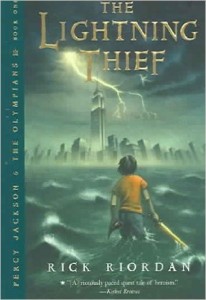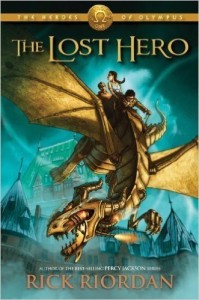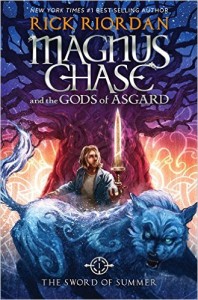Five years ago I picked up a middle grade fantasy book called The Lightening Thief by
Rick Riordan and was hooked by the end of the first page. For those unfamiliar with  Riordan’s work,his first series, “Percy Jackson and the Olympians,” follows a middle school student, Percy, who discovers he’s a Greek demigod, and that he’s destined to either save or destroy the world by the time he reaches his sixteenth birthday (but no pressure).
Riordan’s work,his first series, “Percy Jackson and the Olympians,” follows a middle school student, Percy, who discovers he’s a Greek demigod, and that he’s destined to either save or destroy the world by the time he reaches his sixteenth birthday (but no pressure).
The series was creative, educational, and hilarious. Riordan gave Percy a wonderful narrative voice that appealed to readers of various age groups. Riordan, a former middle school teacher, wrote the series in part to encourage his young son who struggled in school. He made mythology exciting and relevant to today’s culture, while keeping his stories age appropriate. During my time as an English teacher, I recommended the series to parents who asked for fun reading suggestions for their middle grade children. I saw several cases where the Riordan books opened up a love reading in previously reluctant students.
After the conclusion of “Percy Jackson and the Olympians,” he wrote two new series: “The Kane Chronicles” (which focused on Egyptian mythology) and “The Heroes of Olympus” (a continuation of the Percy Jackson stories).
The Kane Chronicles:
I was disappointed by his “Kane Chronicles,” especially the introduction of magic, and the romantic storyline given to the twelve year old female protagonist. I felt the “Kane Chronicles” lost the innocence of his previous works, and I did not feel comfortable recommending that series to my middle grade students. I hoped it was just the more mystical nature of Egyptian mythology that was to blame and eagerly looked forward to his return to the world of Percy Jackson.
The Heroes of Olympus:
 At first, those books held the same light-hearted fun as the Percy Jackson stories, but in 2013 Riordan released the fourth book in the series, and everything changed. The story shifted from Middle Grade to Young Adult territory with the blunt introduction of a homosexual character, higher levels of violence, and a focus on the romantic drama of each character. It felt like Riordan was trying to push an agenda and throw his audience into situations they were not ready to handle.
At first, those books held the same light-hearted fun as the Percy Jackson stories, but in 2013 Riordan released the fourth book in the series, and everything changed. The story shifted from Middle Grade to Young Adult territory with the blunt introduction of a homosexual character, higher levels of violence, and a focus on the romantic drama of each character. It felt like Riordan was trying to push an agenda and throw his audience into situations they were not ready to handle.
Moving Forward:
Riordan announced in 2014 that he was going to write a series that focused on Norse mythology. I was not sure if I wanted to invest my time in this new series, but early reviews of the book were extremely positive and related this new series back to the first Percy Jackson books. I decided to be cautiously optimistic and read The Sword of Summer with an open mind.
There were many elements of the new story that I enjoyed. The protagonist, Magnus,  was different than any character Riordan had previously written. Exceedingly bright, Magnus enjoyed learning, and his age (sixteen at the beginning) lent an air of maturity to the novel. Riordan’s world building is well done, and the supporting characters each bring their own unique flavor to the group. Because the main male and female characters have more of a brother/sister relationship, romance is downplayed. The story was fast paced and kept me interested until the last page.
was different than any character Riordan had previously written. Exceedingly bright, Magnus enjoyed learning, and his age (sixteen at the beginning) lent an air of maturity to the novel. Riordan’s world building is well done, and the supporting characters each bring their own unique flavor to the group. Because the main male and female characters have more of a brother/sister relationship, romance is downplayed. The story was fast paced and kept me interested until the last page.
Unfortunately, several swear words were included in the story, an element lacking in Riordan’s earlier works. The violence was unnecessarily bloody, the worldview irreverent, and Riordan’s once witty humor was overshadowed by crudeness and sarcasm. It saddened me that Riordan’s work took such a worldly and falsely mature turn because his first series was such a fun introduction to Greek mythology. Riordan’s older protagonist opened the way for an older audience, but the books are still marketed for middle grade readers. If families with younger children are fans of “Percy Jackson and the Olympians,” I’d advise them to let this new series pass by unread.
*Images taken from amazon.com
Stay Up to Date!
Get the information you need to make wise choices about books for your children and teens.
Our weekly newsletter includes our latest reviews, related links from around the web, a featured book list, book trivia, and more. We never sell your information. You may unsubscribe at any time.
Support our writers and help keep Redeemed Reader ad-free by joining the Redeemed Reader Fellowship.
Stay Up to Date!
Get the information you need to make wise choices about books for your children and teens.
Our weekly newsletter includes our latest reviews, related links from around the web, a featured book list, book trivia, and more. We never sell your information. You may unsubscribe at any time.
We'd love to hear from you!
Our comments are now limited to our members (both Silver and Golden Key). Members, you just need to log in with your normal log-in credentials!
Not a member yet? You can join the Silver Key ($2.99/month) for a free 2-week trial. Cancel at any time. Find out more about membership here.
5 Comments
Leave a Comment
You must be logged in to post a comment.

Yes we too were Rick Riordan fans until the 4th book of the Olympus series. Definitely felt as if were were being socially engineered.
[…] A Reflection on Rick Riordan […]
Was just interested in your opinion of the introduction of a homosexual character in Riodan’s series?
Melissa,
Thank you so much for your comment. I noted some of my thoughts in my post when I spoke of Riordan’s Heroes of Olympus series, but I’m going to send you an email to follow up!
I am of the opinion that the Heroes of Olympus (especially House of Hades) were more on the YA side of the middle grade – YA cusp. The books got darker as the readers who had grown up with the series’ and continued reading them into teen hood grew up. The recommended age range printed on the inside cover rose too (for the original series it is 7, but that is not the case for the sequels). So I would recommend having your kid wait a few years between when they read those series. However this has nothing to do with Nico being outed as gay. The only way in wish that scene was intense is emotionally as the outing was against Nico’s will before he was mentally ready to say the words out loud.
The Magnus Chase books feel to me to be more early YA than middle grade and the appropriateness of the violence and the (rather mild in comparison to YA) language should be judged through that lens.